#THE REVIEWS R IN!!!
Text
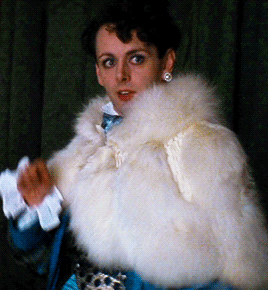
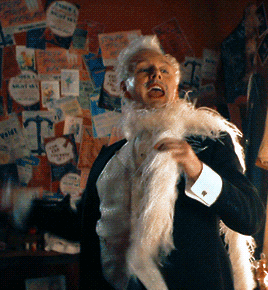
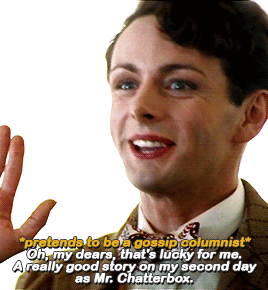
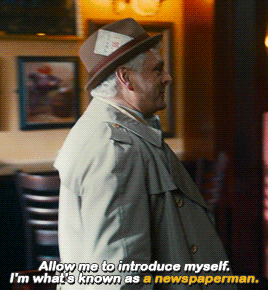




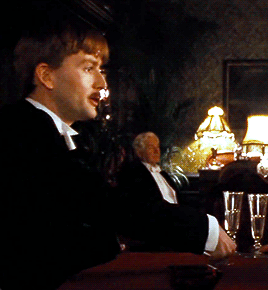
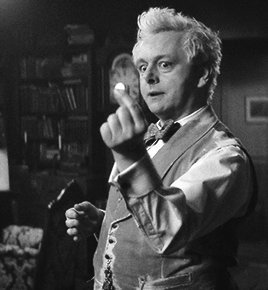
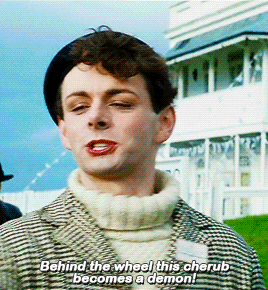


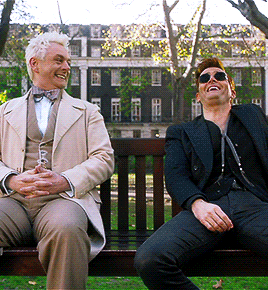


bright young things (2003) / good omens parallels
#good omens#bright young things#aziraphale#miles maitland#crowley#michael sheen#david tennant#goodomensedit#my gifs#rewatched byt at 4 am today#had to do smth so#it's mostly miles. just like the reviews on letterboxd skjsdks#some of these r randomly b&w bc i'm garbage at coloring ://#also the one w/ miles & crowley putting their sunglasses on#it's here specifically to cause psychic damage that's it :^))))#anyhways luv clowning around 🤡
3K notes
·
View notes
Text
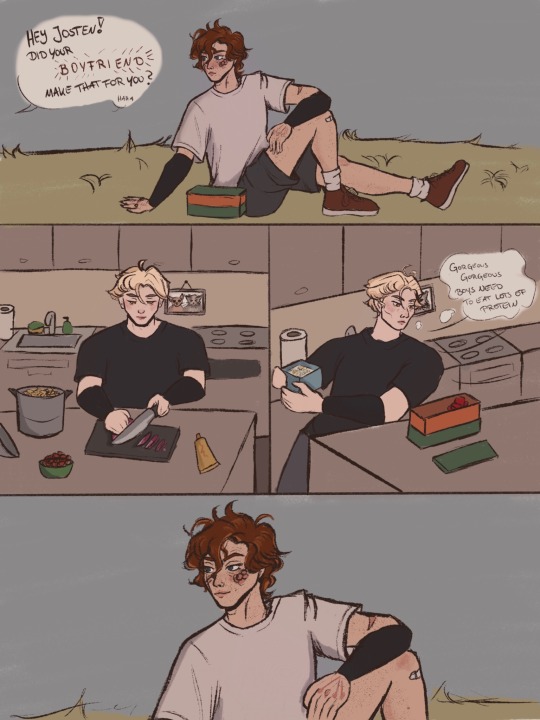
gorgeous gorgeous boyfriends make lunch for each other
#this is the first time i‘ve ever drawn a comic esque thing like this#maybe this was funnier in my head!!! i dont care#this was obviously inspired by that one video of the guy making lunch for his gf#and also the so what if his boyfriend made it for him S P I D E R M A N review that someone made a gif out of lol#aftg#all for the game#neil josten#andrew minyard#andreil#aftg fanart#aftg art#my art
1K notes
·
View notes
Text
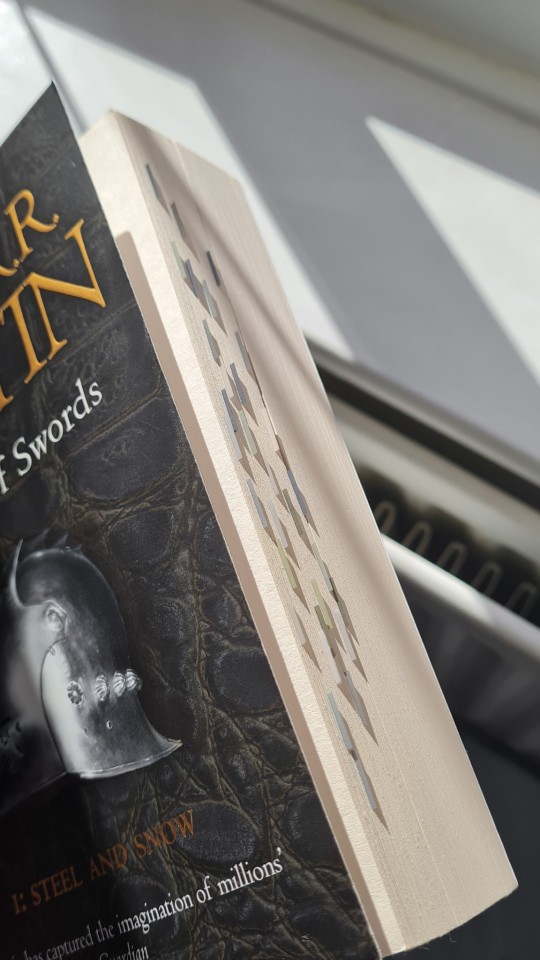

guess who (finally) finished a storm of swords, part one 🖤 being back in this world truly was an experience unlike any other. the world that george r r martin has crafted here is unrivalled — it really is one of the greatest fantasy epics <3 i cannot wait to read part two later this month!!
for now, i'll be starting my next book for my classic tomes challenge 👀 very excited
#a storm of swords#george r r martin#a song of ice and fire#book review#4.5 stars#literature aesthetics#books#book#bookish#bookblr#bookworm#bookstagram#dark academia#booklover#books and libraries#reading update#studyblr#annotations#tabs#annotated bibliography#annotating books#study space#study hard#study tips#study#cafe#beige#lifestyle#aesthetic
209 notes
·
View notes
Text
ppl saying oppenheimer is military propaganda literally missed the point of the movie or maybe just didnt watch the same movie i did idk
ppl saying barbie is anti men literally missed the point of the entire movie (and are also literally just factually wrong??!?!?) or maybe just didnt watch the same movie i did idk
#oppenheimer#barbie#barbenheimer#both wrre so gosh darn good#only negative reviews r just factually incorrect#so silly#i loved them both so much
553 notes
·
View notes
Text
Book Review 68 - Babel by R. F. Kuang

Overview
I came to Babel with extremely little knowledge about the actual contents of the book but a deep sense of all the vibes swirling around its reception – that it was robbed of a Hugo nomination (if the author didn’t outright refuse it), that it’s probably the single buzziest and most Important sf/f release of 2022, that it was stridently political, and plenty more besides. I also went in having mostly enjoyed The Poppy War series and being absolutely enamoured by the elevator pitch of an alternate history Industrial Revolution where translation is literally magic. And, well-
It is wrong to say I hated this book, but only because keeping track of my complaints and starting organize this review in my head was entertaining enough to keep me invested in the reading experience.
The story is set in an alternate 1830s, where the rise of the British Empire relies upon the dominance of its translators, as it is the mixture of translation and silverworking, the inscription of match-pairs in different languages on bars of worked silver and the leveraging of the ambiguity and loss of meaning between them that fuels the world’s magic. The protagonist is pluckted from his childhood home in Canton after his family dies in a cholera outbreak and whisked away to the estate of Professor Lowell, an Oxford translator he quickly realized is his unacknowledged father. He’s made to choose an English name (Robin Swift) and raised and tutored as a future translator in service to the Empire.
The meat of the story is focused on Robin’s education in Oxford, his relationship with the rest of his cohort, and his growing radicalization and entanglement with the revolutionary Hermes Society. Things come to a head when in his fourth year the cohort is sent back to Canton to, well, help provoke the first Opium War, though none of them aware of that. The final act follows the fallout of that, by which I mean it lives up to the full title of “Or the Necessity of Violence: An Arcane History of the Oxford Translators' Revolution”.
To be clear, this was technically a very accomplished book. The writing never dragged and the prose was, if not exactly lyrical, always clear and often evocative. Despite the breadth of space and time the story covers, I never had any complaints about the pacing – and honestly, the ending was, dramatically speaking, one of the more natural and well-executed ones I’ve read recently. It’s very well-constructed.
All that being said – allow me to apologize for how the rest of this is mostly just going to be a litany of complaints. But the book clearly believes itself to be an important and meaningful work of political art, which means I don’t feel particularly bad about holding it to high standards.
Narrative Voice
To start with, just, dear god the tone. This is a book with absolutely zero faith in its audience’s ability to reach their own conclusions, or even follow the symbolism and implication it lays down. Every important point is stated outright, repeated, and all but bolded and underlined. In this book set in 1830s England there are footnotes fact-checking the imperialists talking heads to, I guess, make sure we don’t accidentally become convinced by their apologia for the slave trade? Everything is just relentlessly didactic, in a way that ended up feeling rather insulting even when I agreed with the points Kuang was making.
More than that, and this is perhaps a more subjective complaint but – for an ostensible period piece, the narrative voice and perspective just felt intensely modern? This was theoretically an omniscient third person book, with the narrative voice being pretty distinct from any of the actual characters – with the result that the implicit narrator was instead the sort of person of spends six hours a day getting into arguments on twitter and for this effort calls themselves a progressive activist. The identities of all the characters – as delivered by the objective narration – were all very neat and legible from the perspective of someone at a 2022 HR department listing how diverse their team was, which was somewhere between a tragic lost opportunity to show how messy and historical racial/ethnic/national identities are and outright anachronistic, depending. (This was honestly one of the bigger disappointments, coming from Kuang’s earlier work. Say what you will of The Poppy War series, the narration is with Rin all the way down, and it trusts the reader enough not to blink.) More than that it was just distracting – the narration ended up feeling like an annoying obstacle between me and the story, and not in any fun postmodern way either.
Characters
Speaking of the cast – they simply do not sound or feel like they actually grew up in the 19th century. Now, some modernization of speech patterns and vocabulary and moral commensense is just the price of doing business with mass market period pieces, granted, but still – no 19th century Anglo-Indian revolutionary is going use the phrase ‘Narco-military state’ (if for no other reason than we’re something like a century early for ‘narco-state’ to be coined as a term at all). An even beyond feeling out of time most of the characters feel kind of thinly sketched?
Or no, it’s not that the characters are thinly sketched so much as their relationships are. We’re repeatedly, insistently told that these four students are fast friends and closer than family and would happily die for each other, but we’re very rarely actually shown it. This is partly just a causality of trying to skim over a four-year university education in the middle third of one book, I think, but still – the good times and happy moments are almost always sort of skimmed over, summarized in the course of a paragraph or two that usually talk in terms of memories and consequences more than the relationships themselves. The points of friction and the arguments, meanwhile, are usually played out entirely on the page, or at least described in much more detail. In the end you kind of have to just take it as read that any of these people actually love each other, given that at least two of them seem to be feuding at any given point for the entire time they know each other.
Letty deserves some special attention. She’s the only white member of Robin’s cohort at Babel and she honestly feels like less of acharacter and more a collection of tropes about white women in progressive spaces? Even more than the rest, it’s hard to believe the rest of the class views her as beloved ride-or-die found family when essentially every time she’s on screen it’s so she can do a microagression or a white fragility or something. Also, just – you know how relatively common it is to see just, blatantly misogynistic memes repackaged as anti-racist because it specifies ‘white women’? There’s a line in this that almost literally says ‘Letty wasn’t doing anything to disprove the stereotype of woman as uselessly emotional and hysteric’.
Also, she’s the one who ends up betraying the other three and trying to turn them in when they turn revolutionary. Which is probably inevitable given the book’s politics, but as it happened felt like less of the shocking betrayal that it was supposed to be and more just, checking off a box for a dramatic reverse. Of course she turned on them, none of them ever really seemed to even like each other.
As a Period Piece
So, the book is set in the 1830s, in the midst of the industrial revolution and its social fallout, and the leadup to the First Opium War (which is, through the magic of, well, magic ,but also mercantilist economics, make into a synecdoche for British global dominion more broadly). On the one hand, the setting is impeccably researched, recent and relevant historical events are referenced whenever they would come up, and the footnotes are full to bursting with quotes and explanations of texts or cultural ephemera that’s brought up in the narration.
On the other, the setting doesn’t feel authentic in the slightest, the portrayal of the British Empire is bizarrely inconsistent, and all that richly researched historical grounding ends up feeling less like a living world and more like a particularly well-down set for a Doctor Who episode.
The story is incredibly focused around Oxford as a city and a university. There’s a whole author’s note about the research and slight changes made into its geography and I absolutely believe its portrayal as a physical location and the laws about how women were treated and how the different colleges were organized and all that is exactly as accurate as Kuang wanted them to be. The issue is really the people. With the exception of a few cartoonish villains who barely get more than a couple pages apiece, no one feels, sounds like, or acts like they actually belong in the 19th century. The racism the protagonists struggle with all feels much more 21st century than Victorian, and the frame of mind everyone inhabits still comes across more as ‘unusually blatantly racist Englishman’ than 19th century scholars and polymaths.
This is especially blatant as far as religion goes. It’s occasionally mentioned, sure enough, but to the extent anyone actually believes in Christianity it’s of a very modern and disenchanted sort – this is a society that sends out missionaries as a conscious tool of colonial expansion, not because of anything as silly or absurd as actually wanting to spread their gospel. Also like, it’s Oxford, in the nineteenth century. For all the racism the protagonists have to deal with, they should be getting so much more shit from ‘well-meaning’ locals and students trying to save their (one Muslim, one atheist, one probably Christian but black and protective of Haitian Vodou on a cultural level which would be more than enough) souls.
Or, and this is more minor, it is a central conceit of the whole finale that if a few (like, two) determined revolutionaries can infiltrate Babel they’ll be able to take the entire place hostage with barely any trouble. This is because the students and professors there are, basically, whimpy bookworms who’ll faint at the sight of blood and have no stomach for the sort of violence their work actually supports and drives. Which – look, I really don’t want to defend the ruling class of Victorian Britain here, but I’m not sure physical cowardice is really one of their failings, as a group? I mean, there’s an entire system of institutionalized child abuse in the boarding schools they went to to get them used to taking and dealing out violence and abuse. Basically every upper-class sport is thinly disguised military drill or ritual combat (okay, or rowing). Half of them would graduate to immediately running off and invading places for the glory of the queen. I’m not sure two sleep-deprived nerds with knives would actually have been able to cow the crowd here, is what I’m saying. (This would stick out less if the text wasn’t so dripping with contempt for them on precisely these grounds.)
Much less minor are our heroic revolutionaries themselves. And okay, this is more a matter of taste than anything but like – the Hermes Society is an illegal conspiracy of renegade current and former Babel scholars dedicated to using their knowledge of magic and access to university resources to oppose and undermine the British Empire in general and the work of the school in particular. Think Metternich’s worse nightmare, but in Oxford instead of Paris and focused on colonial liberation (continental Europe barely exists for the purposes of the book, Britain is Empire.) So! A secret society of professional revolutionaries in the heydey of just that, with a name that just has to be Hermetic symbolism, who concern themselves with both high politics and metaphysics.
They are just so very, very boring. This is the age of the Conspiracy of the Equals, the Carbonari, the Seasons! The literal Illumanti are still within living memory! Where’s the pageantry, the ritual, the grandiosity? The elaborate initiation rituals and oaths of undying loyalty? They’re so pragmatic, so humble, so (and I know I keep coming back to this) modern. It’s just such an utter wasted opportunity. Even beyond the level of aesthetics, these are revolutionaries with remarkably little positive ideology – the oppose colonialism and racism for reasons they take as self-evident and so don’t feel the need to theorize about it (and talk about them with the vocabulary of a modern activist, because of course they do), but they’re pretty much consciously agnostic as to what world should look like instead. They vaguely end up supporting a sort of petty-bourgeois socialism (in the Marxist sense), but the alliance with Luddites is essentially political convenience – they really don’t seem to have any vision of the future at all, either in England or the various places they claim as homelands.
On Empire and Industrialization
The story is set during the early nineteenth century, so of course the Industrial Revolution is a pretty core part of the background. The Silver Industrial Revolution, technically, since the Babellers translation magic is in this world a key and load-bearing part of it. Despite the addition of miracle-working enhancers and supports to its fundamental technology, the industrial revolution plays out pretty identically to history – right down to the same cities becoming hubs of industry, despite steam engines using enchanted silver instead of coal and thus, presumably, the entire economic and logistical system that brought this particular cities to prominence being totally unrecognizable. This is not a book that’s in any way actually about tracing how something would change history – which isn’t a complaint, to be clear, that’s a perfectly valid creative choice.
It does, however, make it rather galling that the single actually significant difference to history is that the introduction of magic turns the industrial revolution into a Legend of Zelda boss with a giant glowing weak point you can hit to destroy the whole enterprise.
On a narrative level, I get it – it simplifies things and allows for a far happier and more dramatic ending if destroying Babel is not just a symbolic act but also literally sends London Bridge falling down and scuttles the entire royal navy and every mill and factory in Britain. It’s just that I think that by doing so it trades away any chance for actually making interesting commentary on anti-colonial and -capitalist resistance. A world where a single act of spectacular terrorism really can destroy a modern empire is frankly so detached from our world that it ceases to be able to really materially comment upon it.
Like, the principle reason to not take the Luddites as your role models is not that they were morally vicious but that they were doomed – capitalism’s ability to repair damage to infrastructure and fixed goods is legitimately very impressive! Trying to force an entire ruling class not to adopt a technology that makes whoever commits to it tremendous amounts of money (thus, power) is a herculean task even when you have a state apparatus and standing army – adding an ‘off’ button to the lot of it just trades all sense of relevance for a satisfyingly cathartic ending.
(This is leaving untouched how the book just takes it as a given that the industrial revolution was a strictly immiserating force that did nothing but redistribute money from artisans to capitalists. Which certainly tracks as something people at the time would have thought but given how resolutely modern all the other politics in the work are rings really weirdly.)
All of which is only my second biggest issue with how the book presents its successful resistance movement. It all pales in comparison to making the Empire a squeamish paper tiger.
Like, the book hates colonialism in general and the British Empire in particular, the narrative and footnotes are filled with little asides about various atrocities and injustices and just ways it was racist or complicit in some particular atrocity. But more than that it is contemptuous of it, it views the empire as (as the cliche goes) a perpetually rotting edifice that just needs one good kick; that it persists only through the myth of its own invincibility, and has no stomach for violent resistance from within. Which is absolutely absurd, and the book does seem to know it on occasion when it off-handedly mentions e.g. the Peterloo Massacre – but a character whose supposed to be the grizzled cynical pragmatic revolutionary still spouts off about how slave rebellions succeed because their masters aren’t willing to massacre their own property. Which is just so spectacularly wrong on every axis its actually almost offensive.
More importantly, the entire final act of the story relies upon the fact that the British Empire would allow a handful of foreign students seize control of a vital piece of infrastructure for weeks on end and do nothing but try to wait them out as the national physically falls apart around them. Like, c’mon, there would be siege artillery set up and taking shots by the end of week two. As with the Oxford students, the Victorian elite had all manner of flaws – take your pick, really – but squeamishness wasn’t really one of them.
On Magic
So the magical system underlying the whole story is – you know how Machinaries of Empire makes imperial ideology and metaphysics literally magical, giving expert technicians the ability to create superweapons and destroy worlds provided that the Hexarchate’s subjects observe the imperial calendar of rites and celebrate its triumphs/participate in rituals glorying in the torture of its ‘heretics’? It’s not exactly a subtle metaphor, but it works.
Babel does something similar, except the foundational atrocity fueling the engine of empire on a metaphysical level is, like, cultural appropriation. As an organizing metaphor, I find this less compelling.
Leaving that aside, the story makes translation literally capable of miracle-working – which of necessity requires making ‘languages’ distinct natural categories with observable metaphysical boundaries. It then sets the story in the 19th century – the era of newborn nation states and education systems and national literatures, where the concept of the national-linguistic community was the obsession of the entire European intelligentsia. Now this is not a book concerned with how the presence of magic would actually have changed history, in the slightest, but like – given how fascinated it is by translation and linguistics you’d think the whole ‘a language is a dialect with a navy’ cliché would at least get a light mention (but then the book doesn’t really treat language as any more inherent or natural than it does any other modern identity category, I suppose.)
As an Allegory
Okay, so having now spent an embarrassing number of words establishing to my own satisfaction that the book really doesn’t work at all as a period piece, let us consider; what if it wasn’t trying to be?
A great many things about the book just fit much better if you take it as a commentary on the modern university with Victorian window-dressing. Certainly the driving resentment of Oxford as an institution that sustains itself and grows rich off the exploitation of international students it considers second-class seems far more apt applied to contemporary elite western schools than 19th century ones. Likewise the racism the heroes face all seems like the kind you’d expect in a modern English town rather than a Victorian one. I’m not well-versed enough on the economics of the city to know for sure, but I would wager that the gleeful characterization of Oxford as a city that literally starts falling to ruin without the university to support it was also less accurate in the 1830s than it is today.
Read like this, everything coheres much better – but the most striking thing becomes the incredible vanity of the book. This is a morality tale where the natural revolutionary vanguard with the power to bring global hegemony to its knees through nothing but witholding their labour are..students at elite western universities (not, I must say, a class I’d consider in dire need of having their egos boosted). The emotions underlying everything make much more sense, but the plot itself becomes positively myopic.
Beyond that – if this is a story about international students at elite universities, it does a terrible job of actually portraying them. Or, properly, it only shows a certain type; just about every foreign-born student or professor we meet is some level of revolutionary, deeply opposed in principle to the empire they work within. No one is actually convinced by the carrot of a life as an exploited but exceedingly comfortable and well-compensated technician in the imperial core, and there’s not really acknowledgement at all of just how much of the apparatus of international institutions and governments in the global south – including positions with quite a bit of real power – end up being staffed by exactly that demographic who just sincerely agree with the various ideological projects employing them. Kuang makes it far too easy on herself by making just about every person of colour in the books one of the good guys, and totally undersells how convincing hegemonic ideology can be, basically.
The Necessity of Violence
This is a pet peeve and it’s a very minor thing that I really wouldn’t bring it up if that wasn’t literally part of the title. But it is, so – it’s a plot point that’s given a decent amount of attention that Griffin (Robin’s secret older brother, grizzled professional revolutionary, his introduction to anti-colonialism) is blamed for murdering one of his classmates who had the bad luck to be studying while he was sneaking in to steal some silver – a student that was quite well-loved by the faculty and her very successful classmates, who have never forgiven him. Later on, it’s revealed that this is an utter rewriting of history, and she’d been a double agent pretending to let herself be recruited into the Hermes Society who’d been luring Griffin into an ambush when he killed her and escaped.
This is – well, the most predictable not-even-a-twist imaginable, for one, but also – just rank cowardice. You titled the book ‘the necessity of violence’, the least you can do is actually own it and show that violent resistance means people (with faces, and names, not just abstractions only ever talked about in general terms) who are essentially personally innocent are going to end up collateral damage, and people are going to hold grudges about it. Have some courage in your convictions!
Translation
Okay, all of that said, this isn’t a book that’s wholly bad, or anything. In particular, you can really tell how much of a passion Kuang has for the art and science of translation. The depth of knowledge and eagerness to share just about overflows from the page whenever the book finds an excuse to talk about it at length, and it’s really very endearing. The philosophizing about translation was also as a rule much more interesting and nuanced then whenever the book tried to opine about high politics or revolutionary tactics.
Anyways, I really can’t recommend the book in any real way, but it did stick in my head for long enough that I’ve now written 4,000 words about it. So at the very least it’s the interesting sort of bad book, y’know?
267 notes
·
View notes
Text
it is kinda funny tho that so many people missed the very blatant message of the movie about how easy it is for people to turn on each other when they dont have all the answers .... and they missed this because they wer too angry about not having all the answers
#leave the world behind#its especially funny because i thought it was actually way too obvious about that point#like its a very simple kind of message. and critics mention that too in their reviews#but i guess if the vast majority of audiences r giving it 1 star reviews crying about not understanding it#then ykno maybe it wasnt obvious enough jgdjjjj#ok enough its actually bedtime now loll#200
301 notes
·
View notes
Text
doc sesimic is the literal personification of a cat oh mggdodd.
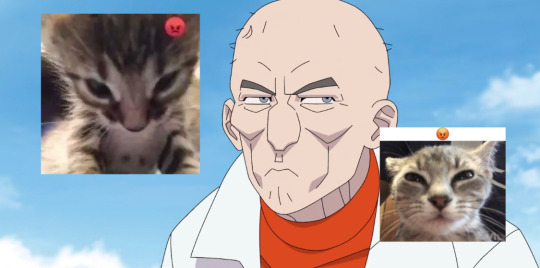
doc sesmic after suffering several hemorrhages:

#invincible#invincible season 2#mark grayson#invincible spoilers#id like to mention I WILL be rewatching it to review the episode#will watch it two times basically#one for enjoyment ;; fhe other for analytical purposes#cuz my mind simply cannot do both .#loving it so far#the lil stray hairs on his head r just misplaced whiskers
293 notes
·
View notes
Text
Favorite steam reviews
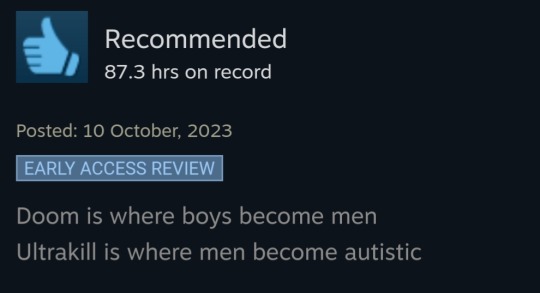
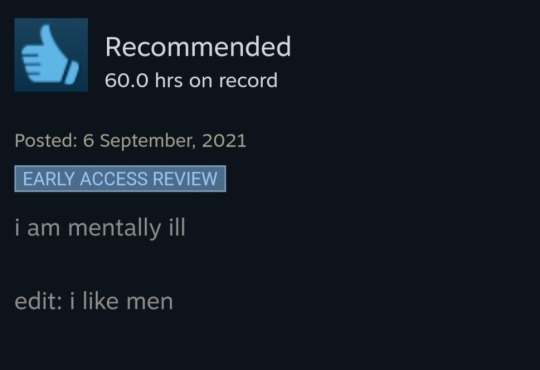
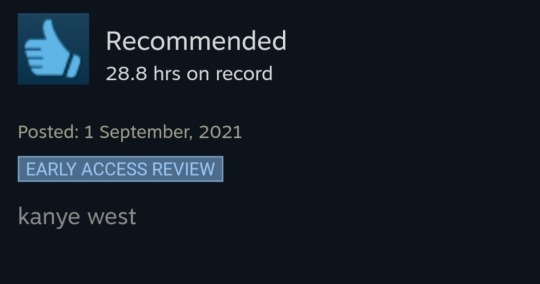
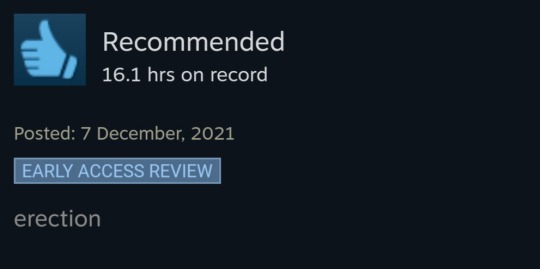
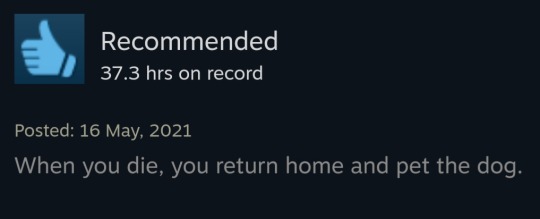

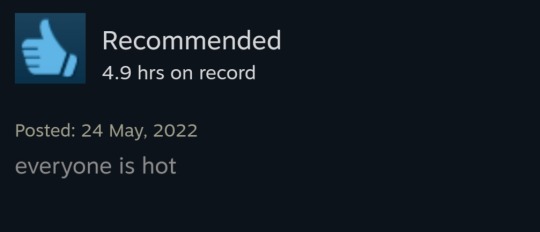

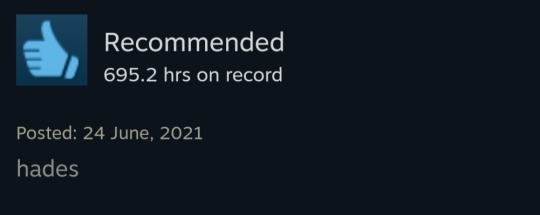
(Name of the game in alt text.)
124 notes
·
View notes
Text
This Week in BL - Korea drops my favorite cameo ever & gives KISSES
Entirely subjective yadda yadda. Organized sorta by favs in each category.
Sept 2023 Wk 1

Ongoing Series - Thai
I Feel You Linger in the Air (Fri grey) ep 4 of 12 - Well that’s one way to find out if he’s gay, see how he reacts to reading a het sex scene out loud. Yai is flirting so hard it’s like he knows everything.
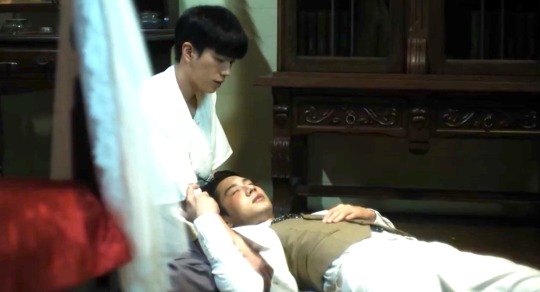
Dangerous Romance (Fri YT) ep 4 of 12 - Oh no! I love them. Also cohabitation trope! Also ALL the other ones: hair dry, meet in childhood... GMMTV going no frills with this one.
Hidden Agenda (Sun YT) ep 9 of 12 - Zo’s drama over Pat helping Joke flirt seems awfully manufactured. I’m losing faith in this show. Could GMMTV PLEASE hand JoongDunk a decent script?
Only Friends (Sat YT) ep 5 of 10 - Sand & Ray are the only interesting couple, and I’m pretty much only watching for them. They gonna go south fast, tho, and they're already ruined by persistent singing. Ooo. When Sand said Top "stole his ex" did he mean Boston? How gay.
Naughty Babe (Sat YT) ep 2 of 8 - The pronoun conversation had a bonkers translation but I enjoyed the actuality of it. The reasons for Yi's trickery are very convoluted soap opera. But I suppose that is the amnesia trope for you.
Be Mine Super Star (Mon Viki) ep 10 of 12 - Boys. We discussed this already. No sex in onsens! I found this one dull, until the end when LLS showed up. Happy to just have him in everything. Thank you Thailand. Looks like it is a classic ep 11 DOOM next week. Who cares?
Venus in the Sky (Tues iQIYI) 1-2 of 10 eps - The usual Thai pulp claptrap this time a reunion romances in and around a convenience store between a boy who recently quit his job and his former bestie who is now a doctor. Mostly not great acting, plot, or production but the sound is okay and no bad effects or singing (so far), so that’s something. The gay brothers have a fun relationship. It’s vampy and campy but fun. I like it but not sure anyone else would.
Love in Translation (Sat iQIYI) ep 4 of 10 - The date was cute but I still don’t like the lead or the premise (we moved into Cyrano de Bergerac territory). It’s moving slowly but it seems like we might be over the crush/stalker part of the narrative, so that’s a relief.
Crazy Handsome Rich (Sun Gaga) ep 2 of 10 - I just can’t. The sound is too weird. With punch down humor and other issues incoming I may DNF this. You’ve been warned. This ep we got to see LLS with his shirt off. Did anything else happen?

Ongoing Series - Not Thai
Jun & Jun (Korea Thur Viki) ep 8fin - No wonder he is everyone’s favorite hyung, boy can read the room like no one else. I love that we got to see exactly how clingy and demanding Choi Jun was always going to be. Only Lee Jun is easy-going enough to put up with him. Also I’ve never watched a KBL with more innuendo. For Korea this was… raunchy. I gotta say had Laws of Attraction not come along, Simon might have been my favorite character of 2023.
Final thoughts on Jun and Jun:
A delightful office romance about an ex-idol who joins cubical life only to find his new boss is his first love. Others boys are sniffing around too. Operative word being "sniffing" as much of this romance involves smell. With a snappy script, enjoyable sides, a pretty as peaches cast, and descent chemistry this show made up for in style what it lacked in substance. I like fluff. I loved this. I smiled every moment I was watching. With tons of rewatch potential (especially the last few eps), my only caution is this is for fans of the BL genre only, I don’t think it’ll work for anyone else. A solid 9/10 from me. HIGHLY RECOMMENDED
I like that Korea is trying high heat, but Taiwan and Thailand are leaps and bounds better at it.
Love Class Season 2 (Korea Fri Viki) eps 9-10fin -
Omg they so cute as flirty bf. Eeeeeeee! CAMEO!!!!! My fav guest couple ever! So exciting!!!! I love that they intersected with MY Strongberry couple (Private Lessons). I’m not used to this but Holy innuendo Korea, what with Jun & Jun and now this show? It’s a bit much for my gay little heart. The final episode was entirely unnecessary, but it was fun to see them being all domestic and stuff. Maru with his dumb lettuce leaves was hilarious. I feel like I need to rewatch this one to really understand it properly, so I will likely do that soon.
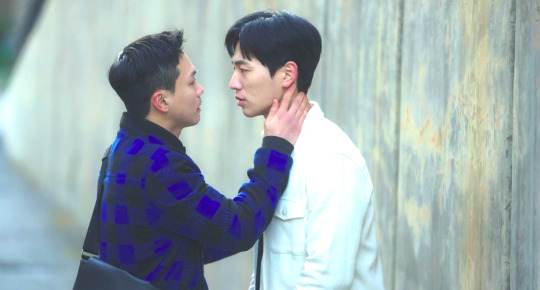
Summary of Love Class 2:
3 couples form within a semester of university: 1. a hyung romance reunion of exes, one of whom has a dangerous past, 2. a friends to lovers romance, and 3. a mature student and TA one night stand + complexities (many aspects of which had me laughing). I enjoyed the characters and dialogue of this show immensely. It was a little bit more breezy and friendly than I was expecting after the first installment, Love Class. I’m not entirely sure Korea can handle multiple couples like this because it definitely felt disjointed, especially the 3rd more mature couple (also my favorite) who probably should’ve had their own series. But it was definitely fun and something different from Korea. 8/10 RECOMMENDED
Also, Korea tried to give us higher heat... that was... interesting. I mean, you tried hon...?
Kisseki: Dear to Me (Taiwan Tues Viki & iQIYI) ep 4 of 13(?) - Everyone is a sad sack this ep. Ooooo. Teach/student my favorite. We never get this one. It’s messy. I’m not sure if there is a plot. I’m not sure they’re sure if there is a plot. But I am still enjoying it.
Why R U? (Korea Wed iQIYI) eps 5-6 of 8 - Why is the Fighter character always so frustrating regardless of name or country? Ji Oh stalking his crush via IG is so relatable. He’s very first crush awkward, unsure, and sweet. They also gave a nice kiss - I love the backpack drop (kiss version of a mic drop?) I still hold that if you haven’t seen the original this might not make much sense. But I am enjoying it.

My Personal Weatherman AKA Taikan Yoho (Japan Sat Gaga) ep 4 of 8 - Oh goody, another JBL where we have to pay attention solely to what they do and not what they say.
Minato's Laundromat Season 2 AKA Minato Shouji Coin Laundry Season 2 (Japan Thu Gaga) ep 9 of 12 - Big fat sigh.
It's Airing But...
My Universe (Sun iQIYI) ep 3 of 24 eps - I couldn't get hold of it and I'm not mad. I'm putting it on hold until distribution gets sorted, or icky get their shizz in order (like that'll happen).
Next Week Looks Like This:

Starting
9/15 You Are Mine (Taiwan Gaga) Secretary has to deal with grumpy boss.
9/15 Bump Up Business AKA Bump Up Project (Korea movie) suspected cinema release? I don't know much about what's going on. Last status update. Love story between a trainee who is about to debut and a celebrity from the same agency. Kpop boy group OnlyOneOf has signed up to star in this idol-based BL (based on a webtoon). They’ve been auditioning for this since Libido IMHO. You can watch me chronicle their BL MV series in this post. It’s from Idol Romance who will do sad but can do good kisses (Wish You, Nobleman Ryu, Once Again, Kissable Lips, Poongduck 304, Tasty Florida, Tinted With You).
Still To Come In September
9/26 I Cannot Reach You AKA I Can't Reach You AKA Kimi ni wa Todokanai (Japan ????) - Adapted from the manga, childhood best friends: The cool, smart one who’s good at everything, and his average, dorky friend who struggles. Always by the other’s side, but not together in the way they truly want to be. No matter how hard they try, their hearts cannot reach each other.
9/27 Absolute Zero (Thai iQIYI) - from 2021, Studio Wabi Sabi and New Siwaj finally bring us this “time loop to prevent tragedy” romance. We don’t always get HEAs from them, so I'm on my guard.
9/27 Bon Appetit (Korea iQIYI) - from 2022, 8 eps from GoGo Studio, romance between an office worker who lives off junk food and the man next door who cooks well.
9/? Mr Cinderella 2 (Vietnam YouTube?)
2023 forthcoming BL master post (see comments, some are inaccurate, NOT KEPT UPDATED).
THIS WEEK’S BEST MOMENTS

I love him. And I love his version of this character better than Jimmy's.

I also love it when a show gets meta. (Both Why R U? Korea) Why they didn't just go for YRU? the world may never know.)
(Last week)
#this week in BL#bl news#BL reviews#korean bl#japanese BL#Taiwanese BL#Thai BL#Rakutan Viki#gagaoolala#GMMTV#Hidden Agenda#JoongDunk#Jun and Jun#Jun & Jun#Jun and Jun review#bl review#Love Class 2 review#Love Class 2#Korean BL reviews#Why R U? Korea#Why R U?
157 notes
·
View notes
Photo
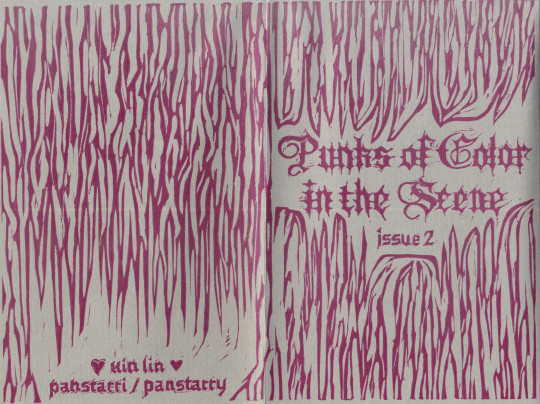



spreads from last semester’s zine 🎇 punks of color in the scene, issue 2
click here to read issue 1
#pan draws#pan designs#zine#zines#this one was very fun even though it killed me a bit <- guy who had too much shit to do#the cover (spread 1) and album covers are linocut. the album/band names + reviews are 3d-printed plates#the whole thing was ran through a letterpress machine in 2 passes—first pass was the black ink and second pass was the pink ink#there r two variants! the one here is on gray ingres paper but theres another version on white masa paper that also has blind deboss#theres like. 22 total in this edition. maybe i'll open shop for these guys. it was fun#i enjoy carving blackletter typefaces looking forward to doing more o7
543 notes
·
View notes
Text




halOPE
#seriously good game. there will b spoilers in the tags cuz im gonna talk abt it#so to start off the charactee design in both appearance and like personality is phenomenal#im so interested in every single character i interacted with!!!!#and the art is sooooo pretty and the music is sooo good#the game inspires so much art from me. this is not the last art of halope u will be seeing from me#ive only gotten one ending so far. idk how to present what ending i got cuz idk how the others r different but hope (me?) killed Mother and#saved regret and got the eye in my stomach instead of the hole. and the hopeful workd didnt happen#i do have some light criticisms but i plan on writing an indepth itch io review so. those can go there along with other details i loved#my art#halope#halope fanart#eye contact
77 notes
·
View notes
Text
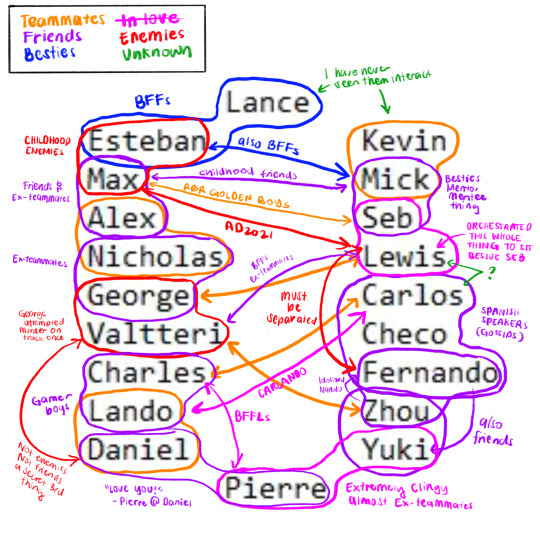
lewis’ grid dinner has some wedding seating arrangements levels of lore
[EDIT 1]: guanyu’s racing idol is nando, hence why they’re beside each other.
[EDIT 2]: forgot to address dan and val’s situationship as well as val and lewis’ bff-ism
[EDIT 3]: i think i erased this from my brain but mick and max are childhood family friends. also included seb and max both being rbr golden boys or whatever
#he rly did the most just to sit next to seb baby its ok u guys can have dinner just the two of u#EDITED BTW AS PER PEER REVIEW#goob.txt#also need to clarify we r looking at this from the perspective of a table arrangement#so yes pierre and este are wtv the fuck but theyre also seated v far away so its not relevant
852 notes
·
View notes
Text
design professors in the last leg of the semester will go i know you guys are loaded down with big projects in all ur other classes on top of studying for finals and your usual priorities. i am going to be part of the problem though
#in the nightmare scenario that any of my profs r following me. you know who u are and im tearing u a new ass on the course review#delete later
52 notes
·
View notes
Text
saw a tweet of someone getting hit by a porsche and being a little too happy about it bcs they got 10k as compensation and.......now i have a new ricky wip.
#i have 2 exams tomorrow i shouldn't be thinking about this but i am!!!!#also. one of the parcels from my stressed induced online shopping session the other day is arriving today.#this was supposed to my post-finals reward but it's arriving way before said finals 😭😭#had a grant total of 1.5hrs of sleep today!!! can't wait to have the same amount of sleep later!!!!#reviewing 17 chapters worth of study material in one day bcs my profs r insane... i love my major i love my major i love my major
89 notes
·
View notes
Text
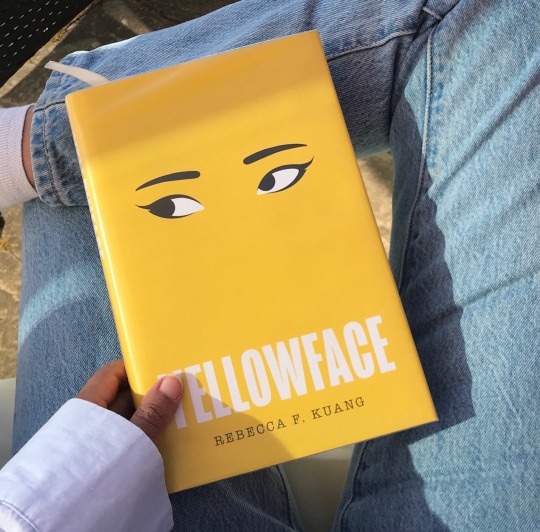

Yellowface — The book is a satirical commentary on the publishing world, the tokenism of Asian writers, writers being pigeonholed to only write books about the “Asian experience” and fake allyship. Kuang did a great job of tackling lots of different areas in 350 pages without it feeling heavy to read.
Bold, funny and shapely written, Yellowface was incredibly fun to read, I literally couldn’t look away from the chaos and devoured the book.
#book review#book reviews#yellowface#r f kuang#booklr#booklover#books#book recommendations#bookish#book#currently reading#book aesthetic#book moodboard
160 notes
·
View notes
Text
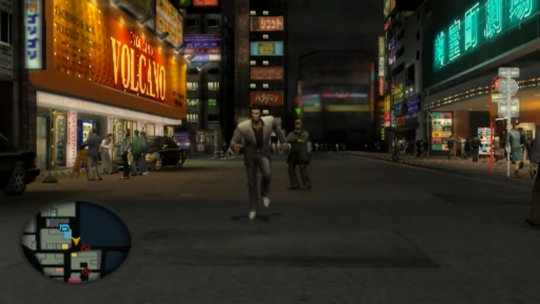
Yakuza
In the early 2000s, Sega developer Toshihiro Nagoshi had an idea for a game. He had been working on arcade hits and cult favorites for the company for years, including a stint as director for the Super Monkey Ball series. He had to fight for it, even sneaking in a reel during a meeting with a then CEO, but eventually got to get a team he was leading to bring an idea he had to life. That idea was Ryu ga Gotoku, or Like A Dragon, localized as Yakuza initially for the west. It was to be something aimed specifically at adult Japanese men, taking inspiration from crime dramas, and most likely some Shenmue DNA from Nagoshi’s time on the first game in its final six months of development. An RPG and beat-em-up hybrid, with a world to explore, but one very familiar to the target audience.
Read more...
#hardcore gaming 101#jonathan kaharl#review#yakuza#like a dragon#action rpg#urban setting#wii u#remakes available#sega#playstation 2#playstation 3#sega ne r&d#video games
44 notes
·
View notes